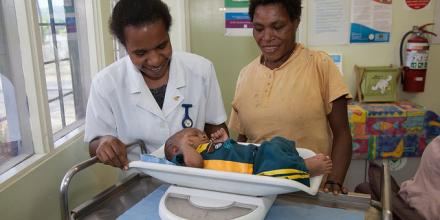Has the Sector Wide Approach delivered improvements in population health?

Event details
Lecture
Date & time
Venue
Speaker
Contacts
Additional links
Sector Wide Approaches (SWAps) for health emerged in the 1990s as a mechanism to improve efficiency of aid delivery and effectiveness of aid. Health SWAps aim to increase recipient government autonomy over aid, allowing greater influence over priority setting. Ultimately, it is hoped changes under SWAps will lead to health improvements, yet evidence on health impacts is scarce. In this talk, Mr Rohan Sweeney spoke to a paper in which he analysed a unique dataset of health‐aid recipient countries over 1990‐2011 to investigate the impact of the implementation of SWAps on infant mortality rates.
Mr Sweeney discussed his findings, in particular evidence suggesting that SWAp implementation facilitated about a 7 per cent reduction in infant mortality rates compared to the counterfactual. However, it has taken time for SWAps to mature before health impacts have been realised.
Mr Rohan Sweeney is a Research Fellow at the Centre for Health Economics, Monash University. He has a particular interest in health economics and health financing in lower income country settings. His recent focus has been on foreign aid for health, employing econometric methods to assess the impacts of Sector Wide Approaches (SWAps) for coordinating health aid.
This public lecture was presented by the Development Policy Centre at Crawford School of Public Policy, The Australian National University.
Updated: 1 September 2024/Responsible Officer: Crawford Engagement/Page Contact: CAP Web Team











